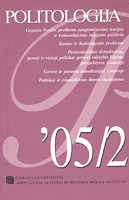Lietuvos saugumo politika ir identitetas šiuolaikinių saugumo studijų požiūriu
Lithuania's Security Policy and Identity considered in the framework of contemporary Security Studies
Author(s): Gražina Miniotaitė, Dovilė JakniūnaitėSubject(s): Politics / Political Sciences
Published by: Vilniaus universiteto leidykla & VU Tarptautinių santykių ir politikos mokslų institutas
Keywords: Foreign security policy of Lithuania; international relations theory; constitution of political identity; integration process; Lithuanian-Polish relations (since 1990).
Summary/Abstract: Foreign security policy of Lithuania, like that of other Baltic states, is closely related to the development of her political identity. The paper is an attempt to elucidate the interaction between Lithuania’s developing identity, conceptualization of security and security policy. The analysis is based on the hypothesis that Lithuania’s political reality may be conceptualized as an interplay at least of two competitive discourses: the discourse on sovereignty and the integration discourse, with each of these reflecting different discursive practices. The sovereignty discourse conceives the nation and the state as real ontological essences, while the integration discourse grants no pre-discursive existence to the nation and treats the state as merely instrumental in respect of human rights. The first part of the paper deals with the theoretical framework underpinning the analysis. By comparing the rationalist and the reflectivist paradigms in international relations theory, their distinctive conceptions of security and identity are defined. The peculiarities of these conceptions are related to the constitution of political identity.The second part of the article illuminates a correlation between security conceptualizations and security policy. The analysis leads to the conclusion that Lithuania’s political identity is constituted within the framework of the sovereignty discourse, with security defined in terms of the securitization / desecuritization processes. In justifying the integration process the meanings which have been shaped in the sovereignty discourse are then transferred to the emerging integration discourse. However, the nation state’s model of the relations between ‘inside’ and ‘outside’, when applied to the integration process, can easily lead to misunderstandings and inadequate assessment of the situation in practical politics. The dynamics of securitization / desecuritization in Lithuania’s security and foreign policy is illustrated by the history of the development of Lithuanian-Polish relations (since 1990).
Journal: Politologija
- Issue Year: 2001
- Issue No: 3 (23)
- Page Range: 20-52
- Page Count: 23
- Language: Lithuanian

